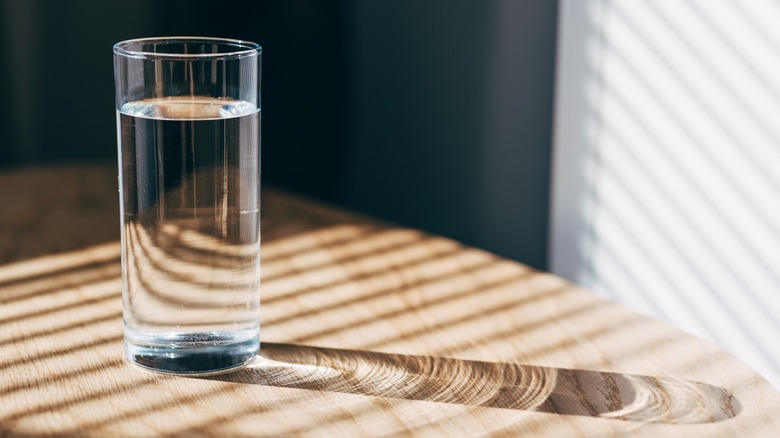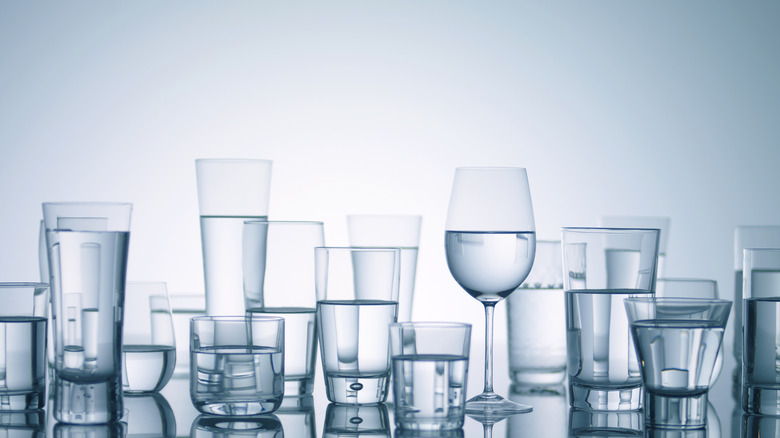Should You Drink That Glass Of Water You Left Out Overnight?
We may receive a commission on purchases made from links.
When thirst beckons, it must be quenched, no matter the hour. Occasionally, however, the half-empty glass of water on your countertop or nightstand goes forgotten until the next morning. In such scenarios, it's fair to wonder if the water is alright to drink after resting idle for hours. While the answer to this question is a judgment call, there are some things to consider before guzzling the tepid water or dumping it down the drain. Glasses of water are best consumed sooner rather than later.
Yet, this has less to do with safety and more to do with quality. With the exception of infused H2O, water doesn't contain anything that spoils, nor is bacteria likely to proliferate overnight, which means that drinking leftover water won't be detrimental to your health. But it could be a detriment to your taste buds. Since water is notorious for absorbing aromas, flavor can be impacted in a major way, especially as it warms to room temperature and aromas intensify.
That said, water can also taste stale and less than enticing due to a series of chemical reactions. When a glass of water rests uncovered for hours, its composition will change somewhat. After several hours, water will absorb carbon dioxide from the air, triggering a reaction that prompts pH levels to drop and gives the liquid a sour twang. Additionally, any added chemicals in a glass of tap water, such as bitter-tasting chlorine, can also dissipate over time, further affecting flavor. In fact, leaving water out for several hours is an easy way to remove the chlorine taste from tap water.
To drink or not to drink?
Although leaving a glass of water out overnight will definitely impact taste, it's worth noting that, because not all water is sourced or processed in the same way (and the source matters when it comes to water's taste), gustatory changes may be more pronounced in certain types of H2O. In any case, as long as you're okay with a slight difference in flavor, then drinking yesterday's water — tap, mineral, or purified — is fine. There is, however, another factor to weigh before sipping, and that's storage. Given that water glasses are uncovered vessels, this can invite a host of debris, dust particles, and potentially even bugs into the glass.
This is why we suggest taking a good look at what's inside your water glass before taking a giant gulp. Otherwise, pour water into a covered carafe or pitcher, like this one by LocknLock on Amazon. Better yet, fill up a (clean!) resealable and reusable bottle to prolong quality. Plastic renditions can work, but materials like glass or stainless steel are more sustainable. Here's our ranking of 12 popular insulated water bottles, 11 great reusable bottles that don't contain lead, and our ranking of 15 popular water bottles for some ideas. Just be mindful that while glass keeps flavors from leaching in, metallic options keep water cooler for longer.
Despite your best efforts, water may still go untouched for days. At which point, leftovers should no longer be consumed. Yet, rather than pour them down the drain, thirsty houseplants prove willing recipients for stale-tasting water. Of course, because nothing compares to a fresh glass, remember that pouring less H2O will limit leftovers and keep you from having to ponder how to handle partially filled glasses of water in the first palace.

